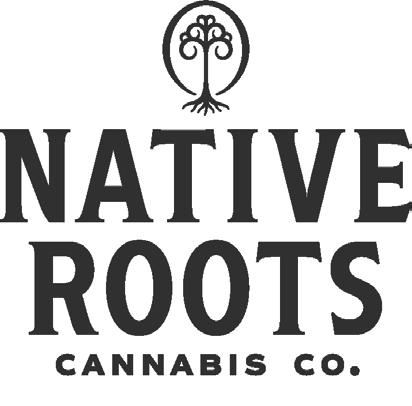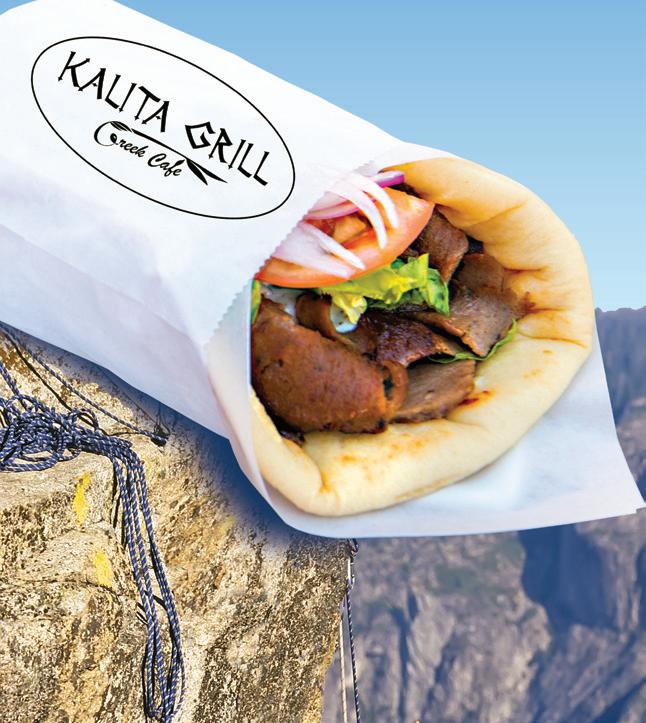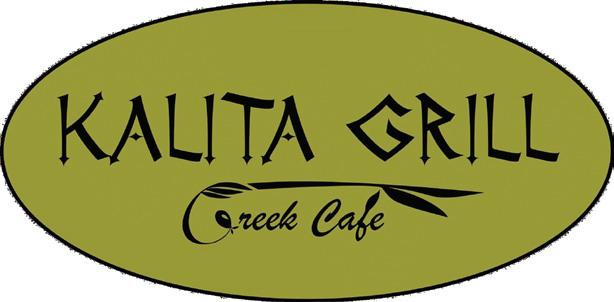
















































































Blue Agave History.
Northern Colorado’s most highly recommended dining attraction.
Blue Agave is familyowned and operated, bringing collectively over five decades of experience in the restaurant business, offering recipes that go back generations



Life in moments that matter – it’s more than just a lamp; it’s illuminating the pages of your favorite novel. It’s more than just a dining table; it’s a place to share meals with loved ones. It’s more than just a hammer; it’s creating hope for your family. When you shop at ReStore, you are not just buying products; you are building a better future.
St. Vrain Habitat ReStore sells low-cost home improvement goods to the public – appliances, building sup plies, furniture, home goods and décor, plumbing, tools, and hardware, and much more! Proceeds support affordable hom eownership opportunities in our local community for hard working families. Shop Tuesdays for our special discount days for seniors, veterans and active military, teachers, and first responders. Great items. Great prices. Great cause. ReStore – life in moments that matter.

It was a dream, people laughed, they said oh no that’s not enough money even to get a rough blueprint. In 2013 we proved them wrong and opened our restaurant. Since the beginning we are committed to cooking with fresh ingredients, from our house made tortillas to our slow braised pork.
Making salsas, beans, rice, soups and stews is an every day event. We are committed to using local ingredients and as sustainable as possible.
Fresh lime juice Margaritas, and specialty tacos are what sets us apart. We love to support the community and the people in it.
We hope to be a big part of the Longmont community as





that derive specifically from Jalisco, Mexico, and the Pacific coast.
Check out our Happy Hour, MonFriday 10a-5pm.


2030 Ken Pratt Blvd. Longmont 303-776-1747




www.blueagaverestaurant.net
St. Vrain Habitat ReStore


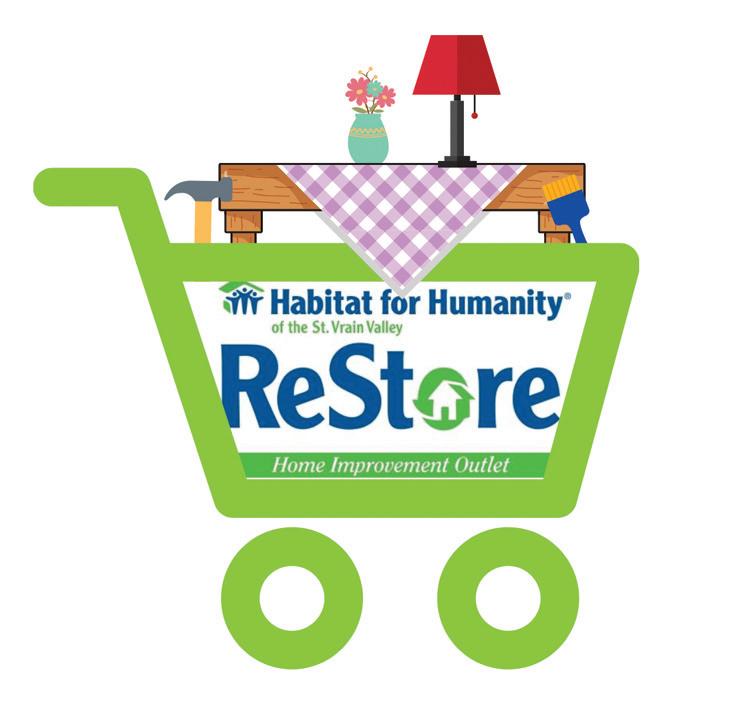

1351 Sherman Drive, Longmont 303-776-3334
www.stvrainhabitat.org/restore
we grow and evolve. Happy Hour 4-6 Monday thru Friday.
1225 Ken Pratt Blvd, Longmont 720-612-7315 www.lunadaeatery.com
Publisher, Fran Zankowski
Circulation Manager, Cal Winn

Editor-in-Chief, Caitlin Rockett
Arts & Culture Editor, Jezy J. Gray
General Assignment Reporter, Will Matuska


Food Editor, John Lehndorff
Intern, Chad Robert Peterson
Contributing Writers: Dave Anderson, Emma Athena, Will Brendza, Rob Brezsny, Michael J. Casey, Angela K. Evans, Mark Fearer, Kaylee Harter, Nick Hutchinson, Dave Kirby, Ari LeVaux, Adam Perry, Dan Savage, Bart Schaneman, Alan Sculley, Toni Tresca, Gregory Wakeman, Colin Wrenn

Market Development Manager, Kellie Robinson
Account Executives, Matthew Fischer, Carter Ferryman, Chris Allred
Mrs. Boulder Weekly, Mari Nevar
Art Director, Susan France

Senior Graphic Designer, Mark Goodman
Sue Butcher, Ken Rott, Chris Bauer
Bookkeeper, Emily Weinberg
Founder/CEO, Stewart Sallo
Editor-at-Large, Joel Dyer
Dec. 8, 2022
Volume XXX, number 17
Cover: Project Censored
As Boulder County's only independently owned newspaper, Boulder Weekly is dedicated to illuminating truth, advancing justice and protecting the First Amendment through ethical, no-holds-barred journalism, and thought-provoking opinion writing. Free every Thursday since 1993, the Weekly also offers the county's most comprehensive arts and entertainment coverage. Read the print version, or visit boulderweekly.com. Boulder Weekly does not accept unsolicited editorial submissions. If you're interested in writing for the paper, please send queries to: editorial@boulderweekly.com. Any materials sent to Boulder Weekly become the property of the newspaper.
690 South Lashley Lane, Boulder, CO, 80305 p 303.494.5511 f 303.494.2585 editorial@boulderweekly.com www.boulderweekly.com
Boulder Weekly is published every Thursday. No portion may be reproduced in any form without written permission from the publisher. © 2022 Boulder Weekly, Inc., all rights reserved.
We are bombarded with countless TV commercials by private insurance companies claiming their “Medicare Advantage” plans are much better and more a ordable than traditional Medicare.
Boulder Weekly
welcomes your correspondence via email (letters@boulderweekly.com). Preference will be given to short letters (under 300 words) that deal with recent stories or local issues, and letters may be edited for style, length and libel. Letters should include your name, address and telephone number for verification. We do not publish anonymous letters or those signed with pseudonyms. Letters become the property of Boulder Weekly and will be published on our website.
Is this too good to be true? e assertion contradicts the research and analysis of health care experts who testied before a recent House Oversight Committee hearing on creating a universal health care system. Rep. Katie Porter (D-California) summarized their conclusions: “ ey told us that Medicare is a far more e cient steward of taxpayer dollars. Private insurance companies spend 17% more on administrative costs than Medicare does. at’s because private insurance companies spend money on things like marketing, commercials, and stock buybacks.”
Medicare has been consistently very popular with both its bene ciaries and the population as a whole since it began in 1965. However, there are holes. It is limited to seniors and certain people with disabilities. It doesn’t cover vision, hearing, dental or long-term care. Bene ciaries are responsible for monthly premiums, deductibles and coinsurance (known as “cost-sharing”).
As a result, progressives support “Expanded and Improved Medicare for All” bills, which would cover everyone. Dental, vision and hearing aids are included. No premiums, deductibles or coinsurance.
A team from three University of California campuses looked at 22 studies on the projected cost impact for single-payer health insurance in the U.S. and found every study predicted Medicare for All would lead to savings. Even the
free market-oriented, Koch-funded Mercatus Center estimated $2 trillion in total savings over a decade.


e grassroots movement for Medicare for All has been steadily growing across the country, including in Colorado.
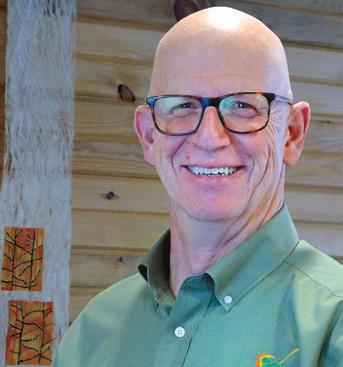
But the Medicare Advantage plans are quite attractive — if you don’t read the ne print. ey are cheaper than traditional Medicare and can o er dental, vision, hearing aids and gym memberships.
However, as Barbara Caress reports in e American Prospect, “the plans o er less freedom of choice, with limited provider networks and prior-approval requirements in exchange for sharply reduced and capped out-of-pocket expenses...”

Rosemary Bartholomew, who led the team that worked on the Health and Human Services report, said this might delay or even prevent a Medicare Advantage bene ciary from getting necessary care. is can be literally a matter of life or death. She said only a small fraction of patients or providers try to appeal these decisions.
e report echoes similar ndings from 2018. e American Hospital Association and the American Medical Association have criticized insurance companies’ tactics for years.

A Times review found four of the ve largest Medicare Advantage insurers have faced federal lawsuits accusing them of fraud.
FROM THREE University of California campuses looked at 22 studies on the projected cost impact for single-payer health insurance in the U.S. and found every study predicted Medicare for All would lead to savings.

She notes that “most recent retirees do not nd the restrictions new or particularly burdensome. Anyone previously insured through an employer health plan dealt with very similar constraints.”


Caress mentions a crucial difference from traditional Medicare: “Medicare still pays, but with Medicare Advantage it turns over all parts of the insurance function, including enforcing the rules for medical necessity and deciding how much to pay providers to private companies.”
What could go wrong? Plenty. In April, the inspector general’s o ce of the U.S. Health and Human Services Department issued a report which concluded that tens of thousands people enrolled in Medicare Advantage plans are denied necessary care that should be covered under the program.
e New York Times reported, “Advantage plans also refused to pay legitimate claims, according to the report. About 18% of payments were denied despite meeting Medicare coverage rules, an estimated 1.5 million payments for all of 2019. In some cases, plans ignored prior authorizations or other documentation necessary to support the payment.”

A recent report of the Majority Sta of the U.S. Senate Finance Committee found widespread aggressive and deceptive marketing practices such as people posing as agents of the IRS and other government agencies, lying about the size of their networks and conning vulnerable people with dementia and cognitive impairment.
e committee’s chairman, Sen. Ron Wyden (D-Oregon) said, “It is unacceptable for this magnitude of fraudsters and scam artists to be running amok in Medicare.”
A recent study found Medicare Advantage plans cost the government $106 billion in overspending from 2010 to 2019. e Biden administration has increased taxpayer funding of Medicare Advantage plans. U.S. Rep. Katie Porter (D-California) led a group of progressive Democrats protesting this.
Dr. Je rey Sachs argues, “We are broken. We spend far more (than other rich nations) on health care; we get far less. Because we don’t even have a health care system. We have a hodgepodge of private overpriced monopolies, whether for-pro t or not-for-pro t.”
Time for Medicare for All. is opinion column does not necessarily re ect the views of Boulder Weekly.

With regards to CU’s Right Here, Right Now Global Climate Summit, I applaud the university for bringing in the brilliant Robin Wall Kimmerer to talk about her book Braiding Sweetgrass. Her talk drew a full house to the Boulder eater on Dec. 1. e book was assigned as a “One Read” for the entire university community. In a pre-talk slide show, CU said the book “invites us to consider our relationship with the natural world and imagine futures of repair and restoration.” It’s a shame that CU’s administration hasn’t understood its assigned reading. e university may be “imagining a future of repair and restoration,” but right here, right now, the university is creating a future of despair and degradation by proceeding with its plan to pave over the largest remaining wetlands on the Front Range. CU’s action will hamper our struggle against the climate crisis by destroying a major carbon sink, will ravage the dwelling places of several endangered species, will increase the risk of ood damage when we get a 500-year ood, and will make impossible the restoration that was originally envisioned for this property (editor’s note: the CU South project)
According to an article in the Daily Camera, CU Boulder Chancellor Philip DiStefano says, “I want to work on solutions that I can make decisions about.” Well, Mr. DiStefano, you have that chance. Re-read the chapter on “ e Honorable Harvest.” en make the decision that doesn’t reek of
Chris Ho man/Boulder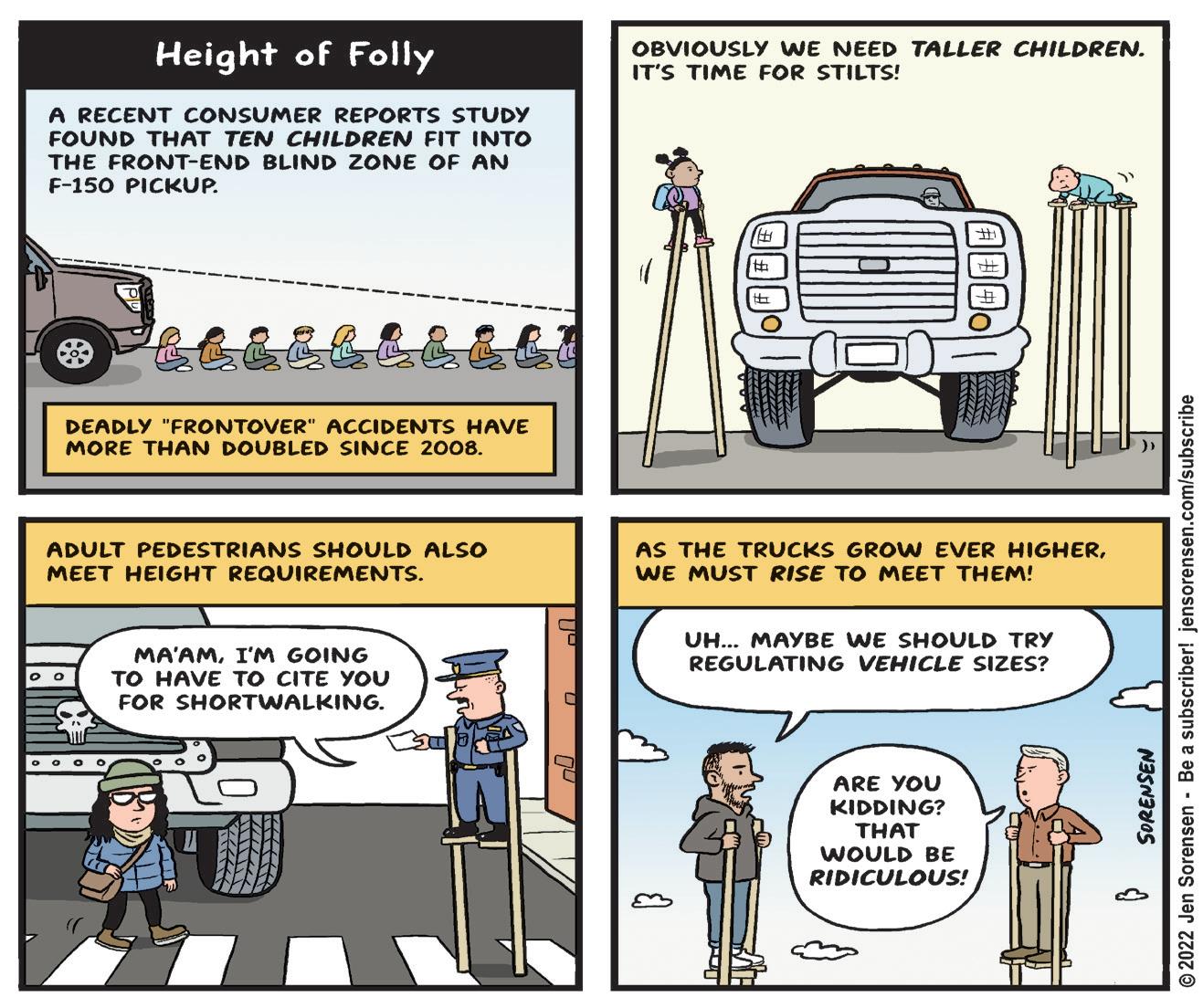
Divesting its fossil fuel holdings would show CU is serious about addressing global climate change and pollution, but it will do little to change the continuing buildup of CO2 in the atmosphere. ese are valuable income sources and will be gobbled up by others in our entrepreneurial economy, and the university is more a corporate business than a socially responsible public institution. e focus for now should be on reducing its climate footprint, something its South Campus expansion ignores completely.
Robert Porath/Boulder

A ordable housing is one of the biggest problems in America (Boulder Weekly, “When no home is a ordable, where do you live?” Dec. 1, 2022). e good news is that Colorado voters passed some relief to build more housing and provide mortgage assistance. Another initiative in Congress has been a renters’ tax credit, modeled after the Child Tax Credit (championed by Sen. Michael Bennet and hopefully to be renewed this month). Sens. Cory Booker and Kamala Harris have both proposed this kind of legislation for renters. Colorado voters can help by asking those who represent them to pass both of these initiatives, that will not only slow rising homelessness, but provide ladders out of poverty for millions of families.
Willie Dickerson/Snohomish, WashingtonProject Censored’s list of the year’s most under-reported stories show one pattern dominating all others this year
by Paul Rosenberg, senior editor,Since its founding in 1976, Project Censored has been focused on stories that aren’t censored in the authoritarian government sense, but in a broader sense re ective of what a functioning democracy should be, censorship de ned as “the suppression of information, whether purposeful or not, by any method — including bias, omission, underreporting or self-censorship — that prevents the public from fully knowing what is happening in society.” It is, after all, the reason that journalism enjoys special protection in the
First Amendment.
Despite the promise of boundless access to information, Silicon Valley mirrors legacy media in its consolidated ownership and privileging of elite narratives. is new class of billionaire oligarchs owns or controls the most popular media platforms, including the companies often referred to as FAANG — Facebook (Meta), Apple, Amazon, Net ix, and Google (Alphabet).
ere are multiple patterns to be found in the list of Project Censored’s stories, and these
di erent patterns have much to tell us about the forces shaping what remains hidden. But the dominance of billionaire control truly is remarkable. It shows how profoundly the concentration of corporate wealth and power in the hands of so few distorts everything we see — or don’t — in the world around us every day.
is piece has been edited for length. You can nd a version with all 10 of Project Censored’s top stories online at boulderweekly.com
Globally, the fossil fuel industry receives subsidies of $11 million per minute, primarily from lack of liability for the externalized health costs of deadly air pollution (42%), damages caused by extreme weather events (29%), and costs from tra c collisions and congestion (15%). And two-thirds of those subsidies come from just ve countries: the United States, Russia, India, China and Japan.
ese are key ndings from a study of 191 nations published by the International Monetary Fund, or IMF, in September 2021, that were reported in e Guardian and Treehugger the next month, but have been ignored in the corporate media.
No national government currently prices fossil fuels at what the IMF calls their “e cient price” — covering both their supply and environmental costs. “Instead, an estimated 99% of coal, 52% of road diesel, 47% of natural gas, and 18% of gasoline are priced at less than half their e cient price,” Project Censored notes.

“E cient fuel pricing in 2025 would reduce global carbon dioxide emissions 36% below baseline levels, which is in line with keeping global warming
to 1.5 degrees, while raising revenues worth 3.8% of global GDP and preventing 0.9 million local air pollution deaths,” the IMF report states. e G7 nations had previously agreed to scrap fossil fuel subsidies by 2025, but the IMF found that subsidies have increased in recent years, and will continue increasing.
“Eliminating fossil fuel subsidies could lead to higher energy prices and, ultimately, political protests and social unrest,” Project Censored notes. “But, as e Guardian and Treehugger each reported, the IMF recommended a ‘comprehensive strategy’ to protect consumers — especially low-income households — impacted by rising energy costs, and workers in displaced industries.”
One reason it’s so rampant is that companies are seldom punished, as Alexia Fernández Campbell and Joe Yerardi reported for the Center for Public Integrity in May 2021, drawing on 15 years of data from the U.S. Department of Labor’s Wage and Hour Division. “ e agency ned only about one in four repeat o enders during that period. And it ordered those companies to pay workers cash damages — penalty money in addition to back wages — in just 14% of those cases,” they wrote. In addition, “ e division often lets businesses avoid repaying their employees all the money they’re owed. In all, the agency has let more than 16,000 employers get away with not paying $20.3 million in back wages since 2005.”

We’re talking about some major companies: Halliburton, G4S Wackenhut and Circle K Stores were among “the worst o enders,” they reported.
“Wage theft includes a range of illegal practices, such as paying less than minimum wage, withholding tips, not paying overtime, or requiring workers to work through breaks or o the clock. It impacts service workers, low-income workers, immigrant and guest workers, and communities of color the most,” Project Censored explains.

Wage theft also includes worker misclassi cation as independent contractors — long the case with port truckers, and more recently gig workers.
In 2017, the Economic Policy Institute released a study saying that just one form of wage theft — minimum wage violations — costs U.S. workers an estimated $15 billion annually, impacting some 17% of low-wage workers.
Lack of resources is largely to blame for the lax enforcement, Project Censored explains: “As of February 2021, the Wage and Hour Division employed only 787 investigators, a proportion of just one investigator per 182,000 workers covered by the Fair Labor Standards Act. For comparison, in 1948, the division employed one investigator per 22,600 workers, or eight times the current proportion.”
Project Censored notes that the Wage eft Prevention and Wage Recovery Act of 2022, if passed, would amend the Fair Labor Standards Act to protect workers from wage theft.
Society, with money coming from Donors Trust (a dark-money group backed by the Koch network) and the Bradley Foundation.
“
ese dark money groups not only funded Leo’s network of organizations to the sum of over $52 million in 2020, but also funded entities in 2020 that played a role in the insurrection to the sum of over $37 million,” Accountable.US reported.
In January 2019, the Environmental Protection Agency, or EPA, stopped releasing legally required disclosures about chemicals that present a “substantial risk of injury to health or the environment.” ey had previously been posted in a searchable public database called ChemView.
In November 2021, e Intercept’s Sharon Lerner reported the EPA had received “at least 1,240 substantial risk reports since January 2019, but only one was publicly available. e suppressed reports documented “the risk of chemicals’ serious harms, including eye corrosion, damage to the brain and nervous system, chronic toxicity to honeybees, and cancer in both people and animals,” Lerner wrote. “ e reports include noti cations about highly toxic poly uoroalkyl substances, or PFAS, chemical compounds that are known as ‘forever chemicals’ because they build up in our bodies and never break down in the environment,” Project Censored notes. “ e Environmental Working Group explains that ‘very small doses of PFAS have been linked to cancer, reproductive and immune system harm, and other diseases. For decades, chemical companies covered up evidence of PFAS’ health hazards.’”
It wasn’t just the public that was kept in the dark, Lerner reported: “ e substantial risk reports have not been uploaded to the databases used most often by risk assessors searching for information about chemicals, according [to] one of the EPA scientists… ey have been entered only into an internal database that is di cult to access and search. As a result, little — and perhaps none — of the information about these serious risks to health and the environment has been incorporated into the chemical assessments completed during this period.”
In January 2022, Public Employees for Environmental Responsibility led a lawsuit to compel EPA to disclose the reports, following up on an earlier public records request which, the National Law Review reported, was “built upon information reported in a November 2021 article in e Intercept.” Just weeks later, EPA announced it would resume posting the reports in ChemView.
At least 100 U.S. representatives and 28 U.S. senators have nancial interests in the fossil fuel industry.
In November and December of 2021, Davie Moore reported in Sludge that 74 Republicans, 59 Democrats, and one independent have fossil fuel industry investments, with Republicans outnumbering Democrats in both chambers. e top ten House investors are all Republicans. But it’s quite di erent in the Senate, where two of the top three investors are Democrats, and Democrats’ total investments, $8,604,000, are more than double the Senate Republicans’ total of $3,994,126. Topping the list is Joe Manchin (West Virginia), with up to $5.5 million of fossil fuel industry assets, while John Hickenlooper (Colorado) is third, with up to $1 million.


“Most signi cantly, many hold key seats on in uential energy-related committees,” Project Censored notes. Senators include Manchin, chair of the Energy and Natural Resources Committee, Tina Smith (D-MN), chair of the Agriculture Subcommittee on Rural Development and Energy, and Tom Carper (D-DE), chair of the Committee on the Environment and Public Works.
In the House, Project Censored explains, “nine of the 22 Republican members of the Energy and Commerce Committee are invested in the fossil fuel industry.

While there has been coverage of dark money spending on Supreme Court nominations, Igor Derysh at Salon was alone in reporting the related involvement in Jan. 6.
Just one group, JCN, spent $2.5 million “before Biden even named his nominee” Ketanji Brown Jackson, Derysh reported, “accusing Biden of caving in to leftists by promising a ‘Supreme Court nominee who will be a liberal activist.’” On the other hand, “JCN spent tens of millions helping to con rm Justices Neil Gorsuch and Brett Kavanaugh, according to Open Secrets, and launched a $25 million e ort to con rm Justice Amy Coney Barrett just weeks before the 2020 election.”
More disturbingly, “Donors Trust has funneled more than $28 million to groups that pushed election lies or in some way funded the rally ahead of the Capitol riot,” while “members of the Federalist Society played key roles in Donald Trump’s attempts to overturn the election,” including attorney (and former visiting CU professor) John Eastman, architect of Trump’s plan to get Vice President Mike Pence to overturn the election, Sens. Josh Hawley (R-MO) and Ted Cruz (R-TX), who led the objections to the certi cation of Trump’s loss after the riot, and Texas Attorney General Ken Paxton, who led a lawsuit to throw out election results in key states, e ectively overturning Biden’s victory. In addition, 13 of the 17 other Republican attorneys general who joined Paxton’s suit were also Federalist Society members.
e same group of conservative dark money organizations that opposed President Joe Biden’s Supreme Court nomination — Judicial Crisis Network [JCN], e 85 Fund and their a liated groups — also funded entities that played a role in the Jan. 6 insurrection, according to a report by the watchdog group Accountable.US. ey’re closely linked to Leonard Leo, co-chair of the Federalist

As Food and Water Watch reported in Nov 2021, “while the cost of meat shot up, prices paid to farmers actually declined, spurring a federal investigation.” at investigation is ongoing, but meat conglomerates Tyson Foods, Perdue Farms, Smith eld Foods and JBS have paid over $225 million to settle related civil suits in the poultry, beef and pork markets.
at’s just part of the problem. A July 2021 joint investigation by Food and Water Watch and e Guardian reported “a handful of ‘food giants’
— including Kraft Heinz, General Mills, Conagra, Unilever and Del Monte — control an average of 64% of sales of 61 popular grocery items,” Project Censored notes. ree companies own 93% of carbonated soft drink brands; while another three produce 73% of the cereals on o er, and a single company, PepsiCo, owns ve of the most popular dip brands — 88% of the market. Altogether, “four rms or fewer controlled at least 50% of the market for 79% of the groceries,” e Guardian reported.

It’s not just producers: “In an October 2021 article for Common Dreams, Kenny Stancil documents that food producers, distributors, and grocery store chains are engaging in pandemic pro teering and taking advantage of “decades of consolidation, which has given a handful of corporations an ever-greater degree of market control and with it, the power to set prices,” according to research by the Groundwork Collaborative.
As for grocers, “Kroger, the largest supermarket chain in the country, cited rising in ation as the reason for hiking prices in their stores even as they cut worker pay by 8%” in 2020, Project Censored notes. Kroger’s CEO earned 909 times what the median worker earned, and “the company spent $1.498 billion on stock buybacks between April 2020 and July 2021 to enrich its shareholders,” the Groundwork Collaborative reported.
“One of the most common in ation scapegoats, supply chain problems, is itself a consequence of consolidation,” Project Censored notes. “Just three global alliances of ocean shippers are responsible for 80% of all cargo... ese shippers raked in “nearly $80 billion in the rst three quarters of 2021, twice as much as in the entire 10-year period from 2010 to 2020,” by increasing their rates as much as tenfold.




In November 2021, for MintPress News, Alan MacLeod examined more than 30,000 individual grants from the the Bill and Melinda Gates Foundation and found it had donated “more than $319 million to fund news outlets, journalism centers and training programs, press associations, and speci c media campaigns, raising questions about con icts of interest and journalistic independence,” Project Censored notes.
“Recipients of this cash include many of America’s most important news outlets, including CNN, NBC, NPR, PBS and The Atlantic. Gates also sponsors myriad in uential foreign organizations, including the BBC, e Guardian, e Financial Times and e Daily Telegraph in the United Kingdom; prominent European newspapers such as Le Monde (France), Der Spiegel (Germany) and El País (Spain); as well as big global broadcasters like Al-Jazeera,” he reported.

“MacLeod’s report includes a number of Gates-funded news outlets that also regularly feature in Project Censored’s annual Top 25 story lists, such as the Solutions Journalism Network ($7.2m), e Conversation ($6.6m), the Bureau of Investigative Journalism ($1m), and ProPublica ($1m),” Project Censored notes. “Direct awards to news outlets often targeted speci c issues, MacLeod reported. For example, one grant earmarked $2.3 million for e Texas Tribune ‘to increase public awareness and engagement of education reform issues in Texas.’ As MacLeod noted, given Bill Gates’ advocacy of the charter school movement — which undermines teachers’ unions and e ectively aims to privatize the public education system — ‘a cynic might interpret this as planting pro-corporate charter school propaganda into the media, disguised as objective news reporting.’”

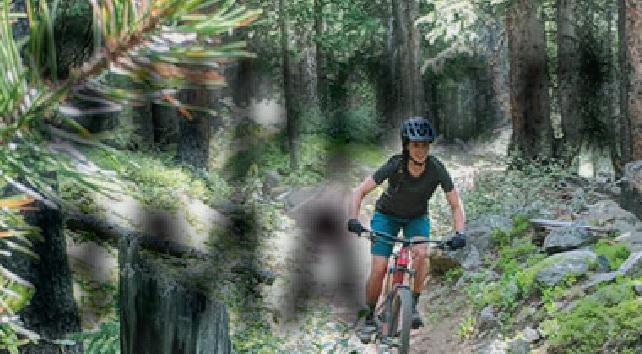
Paul Rosenberg is a Los Angeles, California-based writer, senior editor for Random Lengths News, and a columnist for Salon and Al Jazeera English. ©Random Lengths News, a division of Beacon Light Press, 2022.


MARCH 21-APRIL 19: Aries painter Vincent van Gogh was renowned for translating his sublime and unruly passions into colors and shapes on canvas. It was a demanding task. He careened between torment and ecstasy. “I put my heart and soul into my work,” he said, “and I have lost my mind in the process.” That’s sad! But I have good news for you, Aries. In the coming months, you will have the potential to reach unprecedented new depths of zest as you put your heart and soul into your work and play. And hallelujah, you won’t lose your mind in the process! In fact, I suspect you will become more mentally healthy than you’ve been in a long time.
APRIL 20-MAY 20: “The soul is silent,” writes Taurus poet Louise Glück. “If it speaks at all, it speaks in dreams.” I don’t agree with her in general, and I especially don’t agree with her in regard to your life in the coming weeks. I believe your soul will be singing, telling jokes, whispering in the dark, and flinging out unexpected observations. Your soul will be extra alive and alert and awake, tempting you to dance in the grocery store and fling out random praise and fantasize about having your own podcast. Don’t underestimate how vivacious your soul might be, Taurus. Give it permission to be as fun and funny as it yearns to be.
MAY 21-JUNE 20: The coming weeks will be an excellent time to expand your understanding about the nature of stress. Here are three study aids: 1. High stress levels are not healthy for your mind and body, but low to moderate stress can be good for you. 2. Low to moderate stress is even better for you if it involves dilemmas that you can ultimately solve. 3. There is a thing called “eustress,” which means beneficial stress. It arises from a challenge that evokes your vigor, resilience, and willpower. As you deal with it, you feel hopeful and hardy. It’s meaningful and interesting. I bring these ideas to your attention, dear Gemini, because you are primed to enjoy a rousing upgrade in your relationship with stress..
JUNE 21-JULY 22: Long before he launched his illustrious career, Cancerian inventor Buckminster was accepted to enroll at Harvard University. Studying at such a prestigious educational institution was a high honor and set him up for a bright future. Alas, he was expelled for partying too hard. Soon he was working at odd jobs. His fortunes dwindled, and he grew depressed. But at age 32, he had a pivotal mystical experience. He seemed to be immersed in a globe of white light hovering above the ground. A disembodied voice spoke, telling him he “belonged to the universe” and that he would fulfill his life purpose if he applied himself to serving “the highest advantage of others.” How would you like a Buckminster Fuller-style intervention, Cancerian? It’s available if you want it and ask for it.

JULY 23-AUG. 22: Leo-born Judith Love Cohen was an electrical engineer who worked on NASA’s Apollo Space Program. She was also the mother of the famous actor Jack Black. When she was nine months pregnant with Jack, on the day she went into labor, she performed a heroic service. On their way to the moon, the three astronauts aboard the Apollo 13 spacecraft had encountered a major systems failure. In the midst of her birth process, Judith Love Cohen carried out advanced troubleshooting that helped save their lives and bring their vehicle safely back to Earth. I don’t expect you to achieve such a monumental feat in the coming days, Leo. But I suspect you will be extra intrepid and even epic in your efforts. And your ability to magically multitask will be at a peak.
AUG. 23-SEPT. 22: When you’re at the height of your powers, you provide the people in your life with high-quality help and support. And I believe you could perform this role even stronger in 2023. Here are some of the best benefits
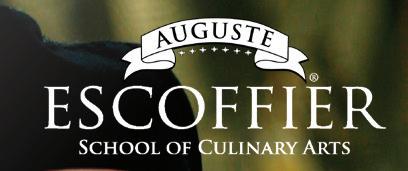

you can offer: 1. Assist your allies in extracting bright ideas from confusing mishmashes. 2. Help them cull fertile seeds from decaying dross. 3. As they wander through messy abysses, aid them in finding where the redemption is. 4. Cheer on their successes with wit and charm.

SEPT. 23-OCT. 22: A blogger named Daydreamydyke explains the art of bestowing soulful gifts. Don’t give people you care for generic consumer goods, she tells us. Instead, say to them, “I picked up this cool rock I found on the ground that reminded me of you,” or “I bought you this necklace for 50 cents at a yard sale because I thought you’d like it,” or “I’ve had this odd little treasure since childhood, but I feel like it could be of use to you or give you comfort, so I want you to have it.” That’s the spirit I hope you will adopt during the holiday season, Libra—as well as for all of 2023, which will be the year you could become a virtuoso gift-giver.
OCT. 23-NOV. 21: In 1957, engineers Alfred Fielding and Marc Chavannes invented three-dimensional plastic wallpaper. No one bought the stuff, though. A few years later, they re-branded it as Bubble Wrap and marketed it as material to protect packages during shipment. Success! Its new use has been popular ever since. I suspect you are in a phase comparable to the time between when their plastic wallpaper flopped and before they dreamed up Bubble Wrap. Have faith in the possibility of there being a Second Act, Scorpio. Be alert for new applications of possibilities that didn’t quite make a splash the first time around.
NOV. 22-DEC. 21: I applaud your expansive curiosity. I admire your yearning to learn more and more about our mysterious world as you add to your understanding of how the game of life works. Your greed for interesting experiences is good greed! It is one of your most beautiful qualities. But now and then, there come times when you need to scale down your quest for fresh, raw truths and work on integrating what you have already absorbed. The coming weeks will be one of those times.
DEC. 22-JAN. 19: Better than most, you have a rich potential to attune yourself to the cyclical patterns of life. It’s your birthright to become skilled at discerning natural rhythms at work in the human comedy. Even more fortunately, Capricorn, you can be deeply comforted by this awareness. Educated by it. Motivated by it. I hope that in 2023, you will develop your capacity to the next level. The cosmic flow will be on your side as you strive to feel the cosmic flow—and place yourself in closer and closer alignment with it.


JAN. 20-FEB. 18: Anne, a character in a book by L. M. Montgomery, says she prefers the word “dusk” over “twilight” because it sounds so “velvety and shadowy.” She continues, “In daylight, I belong to the world . . . in the night to sleep and eternity. But in the dusk, I’m free from both and belong only to myself.” According to my astrological assessment, you Aquarians will go through a dusk-like phase in the coming weeks: a time when you will belong solely to yourself and any other creature you choose to join you in your velvety, shadowy emancipation.
FEB. 19-MARCH 20: My Piscean friend Venus told me, “We Pisceans feel everything very intensely, but alas, we do not possess the survival skills of a Scorpio or the enough-is-enough, self-protective mechanism of the Cancerians. We are the water sign most susceptible to being engulfed and flooded and overwhelmed.” I think Venus is somewhat correct in her assessment. I also believe you Fishes have a potent asset that you may not call on enough. Your ability to tune into the very deepest levels of emotion potentially provides you with access to a divine power source beyond your personality. If you allow it to give you all of its gifts, it will keep you shielded and safe and supported.






Former Denver resident Ted Conover immerses himself among the San Luis Valley prairie dwellers in ‘Cheap Land Colorado’
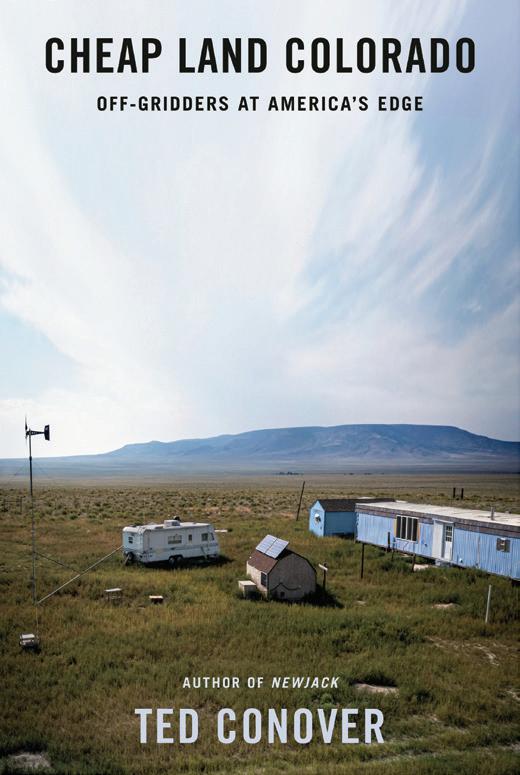 by Bart Schaneman
by Bart Schaneman
From working as a guard in Sing Sing prison to inspecting meat in a Nebraska beef plant, Ted Conover has taken on some difficult assignments in his long and decorated career as an immersive journalist.

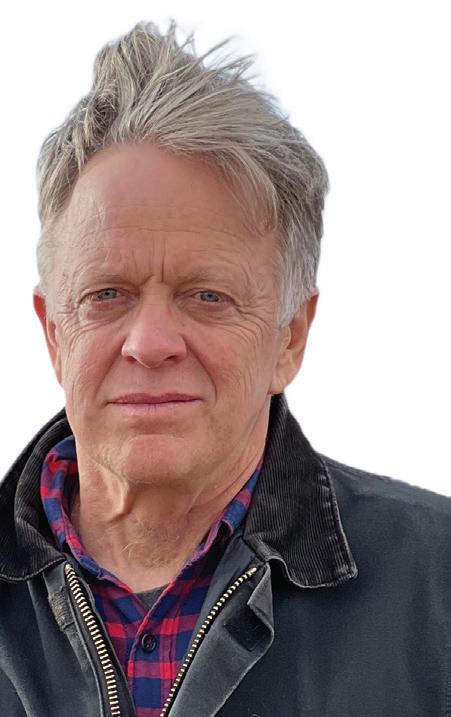
But trying to live among and write about people who have intentionally moved as far away as they can from mainstream society, as Conover did for his new book Cheap Land Colorado: Off-Gridders at America’s Edge, required extra tact and finesse.
Over the course of four years, the former Denver resident and Pulitzer Prize finalist lived and worked on the plains of the San Luis Valley in the south-central region of the state, where people, for all manner of reasons, have come to stake their claims on $5,000, five-acre plots of land.
“It’s a very different world from the one most of us inhabit,” Conover says. “And it’s got a lot of people who are not looking to meet strangers.”
He highlighted the fact that a Google search of his name quickly shows he’s a journalist and a professor who lives in New York City, which is “three strikes to some people,” he says.
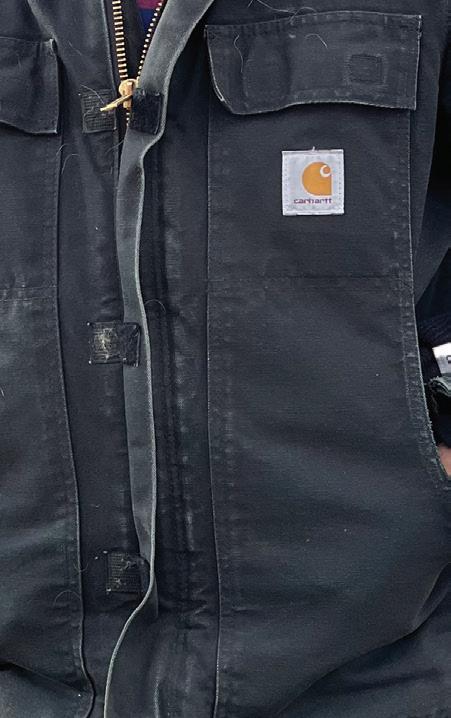
To gain favor and meet the people he wanted to write about, Conover volunteered for La Puente, a nonprofit organization that helps the poor. As part of his duties, he would deliver free firewood to people out on the prairie who lived in modular homes, ramshackle quarters often made out of RVs and other cobbled-together domiciles.
But his volunteer work alone didn’t cure the pervasive skepticism about another stranger coming to this harsh, unforgiving environment.
“On the prairie, people often resist getting to know new people until they’ve lasted at least one winter,” Conover says. That resistance is owed to a few reasons. A lot of people don’t make it that long, for one, and many underestimate how difficult it is to live in such a place and end up abusing the kindness of a helping hand.
“What you fear out there is your neighbor’s needs,” Conover says. “They [might] find themselves suffering and look to you for help.”

As is typical of his work, Conover’s writing goes far deeper than the surface of the subject, mainly because he essentially became one of the 1,000 or so people living on the five-acre plots of land between the Sangre de Cristo and the San Juan mountains near Alamosa. He went as far as buying a place to live, which he still owns.
“My project was to understand life on the flats, and ownership was a major part of that,” he writes in the book. “I could interview a hundred landowners (and prob-
ably had), but it seemed to me I’d understand them all better if I were an owner.”



In a way similar to Jessica Bruder’s 2017 book Nomadland: Surviving America in the Twenty-First Century , which was made into an Academy Award-winning movie, Cheap Land Colorado ends up saying as much about American society as it does about the individual lives it depicts.
“You can definitely see that the presence of some people out there points to our failure as a country to offer other paths for low-income people,” Conover says. “[Many] have been through various kinds of trauma, whether it’s military service, or losing their house, falling under an addiction that has cost them their dearest friends and relatives … I’m not saying America is responsible for all of this, but somehow we produce a lot of people who don’t fit in.”

Another set of people Conover depicts are those who simply came to leave urban life behind.
“Generally speaking, the flats residents I met were not the young and idealistic (though there were exceptions),” he writes. “Rather, they were the restless and the fugitive; the idle and the addicted; and the generally disaffected, the ‘done with what we’re supposed to do’ crowd. People who, feeling chewed up and spit out, had turned away from and sometimes against institutions they’d been involved with all of their lives, whether companies or schools or the church. The prairie was their sanctuary and their place of exile.”
That’s not to say the entire picture he paints is bleak, though the poverty and the lack of job opportunities, health care and quality education can be grim. Despite that, Conover notes that the land and the sky and the weather are all romantic and beautiful, and these people had chosen to come live there, difficulties be damned. “That added something hopeful to the whole equation,” he writes.
Making a life out there does have its positives for some families, as Conover puts it. One family, for example, wasn’t getting by with dad painting houses in Greeley and mom taking care of three kids. So they figured they would reduce their needs and live in a trailer out on the prairie.
“They live hand to mouth, but they will tell you this is where they want to be and they wouldn’t want to live somewhere else,” Conover says. “They might wish they had more of a padding for when the truck breaks down. And when [dad] gets sent to the hospital in Denver because of blood clots in his leg. But they seem, on balance, to be glad they’re there.”
For someone in Boulder reading this thinking they want to head south for some cheap land, Conover suggests they consider the whole picture.
“The upsides are pretty clear,” he says. “The land is cheap. For much of the year, the weather is nice. But they should consider the downsides, which is that if you don’t stay there, for the rest of your lives, things you might leave on your property might not be secure, like building materials or anything.”
Conover says whole RVs can disappear while people are away because of the needs of their neighbors. And selling the land might be impossible because there’s an oversupply of five-acre lots.
“That’s the wrench in this frontier dream,” he adds. “It may not make financial sense. It’s not a great investment. It’s an easy way to lose money. But the startup costs are low.”
ON THE SHELF: Cheap Land Colorado: Off-Gridders at America’s Edge is available now via Penguin Random House.
The last couple years have been strange for Bartees Leon Cox Jr. After his 2020 debut album Live Forever caught fire in the early days of the pandemic — lighting up audiences with its genre-scrambling fusion of indie rock, hip-hop, electronic dance music and midwestern emo — the 33-year-old music artist known as Bartees Strange has found himself trading a career in communications for sold-out tours, broadcast television appearances and shared billing with some of the very bands he grew up admiring in the rural suburbs west of Oklahoma City.



The timing and tenor of this success has abruptly knocked the D.C.-based musician into another orbit, but it didn’t come out of nowhere. Since he picked up his first guitar as a teenager, zapped by the otherworldly energy of millennial New York art-rock heroes TV on the Radio, Strange says there was no question as to whether he would build a life around his songs.


“I didn’t ever think I would make it. I just knew I was never going to stop,” he says. “I doubted it my entire 20s, because I was thinking of it the wrong way. I was comparing myself to all these artists who were having these huge moments. I was like, ‘Damn, I missed my shot.’”

But Strange didn’t miss his shot. Instead, with this year’s release of his acclaimed sophomore effort Farm to Table, he’s having his biggest moment yet. Released last June on the legendary British indie label 4AD, his blistering and beautiful new record was met with glowing reviews from new-media tastemakers like Pitchfork and old guards like Rolling Stone, landing the emerging musician at the
center of human-interest profiles in The Washington Post, The New York Times Magazine, PBS NewsHour and elsewhere.
“It makes me think about the next couple years,” Strange says when asked about how far he’s come since the shot in the dark of his chameleonic debut. “Because honestly, I’m like, ‘Whoa, that shit worked! I can’t believe it. What could happen next?’”
This journey from the rural reaches of the Sooner State to indie rock stardom is right there in the title of Strange’s latest: Farm to Table. It’s partly a reference

around,” he says. “I started wondering, ‘How do you get a seat at that table? How do you become one of those people?’ It felt so out of reach.”
But there’s a second meaning to that turn of phrase (“a seat at the table”) that underscores the challenges of navigating the alt-rock world as an artist of color. It’s a conversation Strange doesn’t shy away from, and one he hopes will prop open the door for more Black and brown artists on the same path.
“Farm to Table is about getting to the table with these people you admire. Now I’m at the table and everybody’s white,” he says. “I’m realizing my journey is not going to be like any of these people’s journeys, no matter how much I respect and love their music. My journey is going to be different — maybe for better, maybe for worse, but it’s going to be mine.”
to his former summer job painting fences on a farm in Yukon, Oklahoma, before making his way decades later to a seat at the glass-top conference tables of the music industry — a place he never thought he’d be.
“As I got older, I started falling more and more in love with music, and I was seeing these artists I wanted to be


Like the pixelated Black Jesus collaged in a Last Supper scene alongside the artist’s childhood photos on the cover of his new LP, Strange has found himself pulling up his chair at a pivotal moment. Now he’s using the opportunity to say something that matters, and say it with his whole chest. Take album standout “Hold the Line,” a tender tearjerker replete with weeping slide guitar, in which Strange bends words of comfort and resolve toward the surviving young daughter of George Floyd in the wake of his high-profile killing by a Minneapolis police officer.

“I grew up in a pretty white, rural place. And a lot of my life I was very
afraid of dying from the police or someone who just didn’t like me. My parents grew up in the Deep South in the ’60s; their parents grew up in the ’30s and ’40s. So the nightmare stories I’ve heard are extreme,” Strange says. “As a kid, that just buries itself within you. So to see someone get killed and they’re playing it over and over on TV, you’ll never be able to make sense of it. Your whole body reacts.”
ON THE BILL: Bartees Strange with Pom Pom Squad and They Hate Change. 8 p.m. Wednesday, Dec. 14, Bluebird Theater, 3317 E. Colfax Ave., Denver. Tickets: $20, axs.com
Elsewhere, Farm to Table carries on its singular exploration of grief, success and family dynamics with the artist’s trademark restlessness. From the twinkling emo guitars kicking off album opener “Heavy Heart” to the dancefloor-ready pulse of “Wretched” and the punk-show explosion of “Escape This Circus,” Strange’s new rollercoaster of a record is the sound of an uncontainable new voice in the broadly defined world of indie rock. It all culminates in a soulful, strippeddown closing track (“Hennessey”) that finds Strange laying himself bare for the listeners whose attention he’s fought so hard for over the course of his long and winding path to the table.
“Through the record there are all these huge leaps — we have our big rock moments, big rap moments. A lot of things are happening from song to song,” he says. “I felt like I needed something to remind people that I’m a normal person. There’s all this shit happening, but it’s just me. It’s just Bartees.”
‘Is it really so strange?’
On the heels of a breakout year, genre-allergic art rocker Bartees Strange breaks down his winding journey from ‘Farm to Table’ by Jezy J. Gray
AMAZON.COM SERVICES LLC, an Amazon.com company - Boulder, Colorado. Software Development Engineer III: Drive the architecture & design of large-scale, multi-tiered, distributed SW apps, tools, systs &







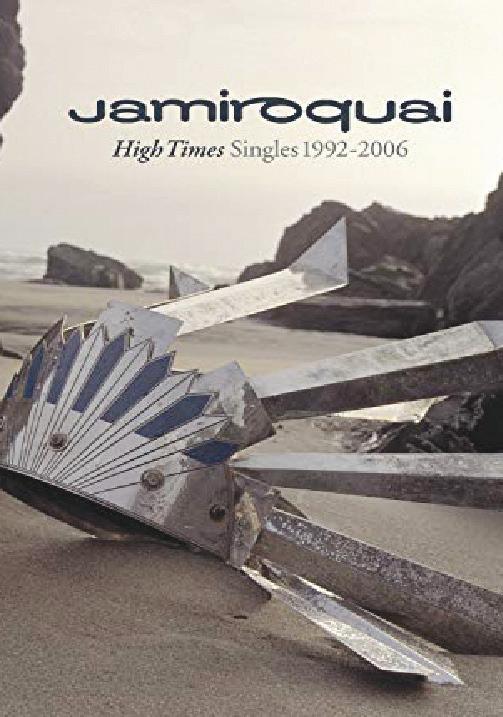
















using object-oriented design, distributed programming, Java and C/C++. (AMZ6155207). Multiple job openings. Apply online: www.amazon. jobs – search by AMZ6155207. EOE.
Estate of Joseph Allen Negri aka Joseph A. Negri aka Joseph Negri, Deceased Case No.: 22PR30568 All persons having claims against the abovenamed estate are required to present them to the Personal Representative or to the District Court of Boulder County, Colorado on or before March 24, 2023, or said claims may be forever barred.


STEWART+GORDON, Personal Representative 3650 S YOSEMITE ST 214 DENVER, Colorado 80237































Theatre Or’s revival of their award-winning production of ‘Sisters in Law’ is a funny and fascinating reach across the aisle by


 Toni Tresca
Toni Tresca


Justice is served in Sisters in Law, a hilarious and captivating play about the relationship between the first two female U.S. Supreme Court justices, Sandra Day O'Connor and Ruth Bader Ginsburg. Back by popular demand, Theatre Or presents a limited run of their Henry Award-winning production at the University of Denver’s Newman Center through Dec. 11.
Sisters in Law was written by former federal prosecutor Jonathan Shapiro and is based on Linda Hirshman's 2015 novel of the same name. The play had its world premiere in 2019 at the Phoenix Theatre Company, with Theatre Or presenting it in Denver two years later. The latest production brings back the original local cast of Sally Knudsen as Sandra Day O’Connor and A. Lee Massaro as Ruth Bader Ginsburg (2022 Henry Award winner for Best Actress) for this ever-timely show.

Even though O’Connor, a conservative justice appointed by President Ronald Reagan in 1981, and Ginsburg, a liberal justice appointed by President Bill Clinton in 1993, came from different political parties, religions and parts of the country, they were able to find common ground through their mutual respect for the law. The play honors the pioneering judges and explores the advantages and disadvantages of the Supreme Court as a catalyst for change.










Audiences for this weekend’s final run of performances will be struck by Laura K. Love's monumental set design. Marble steps lead up to the massive Supreme Court bench that looms large over the space. Love's work highlights the differences between these two women through the stark contrasts in their offices, underscoring how the pair were forced to cooperate on the bench despite sharp differences in style and politics. The floor is painted to articulate this point, as the unique floors of each of their offices bleed into the united floor pattern of the Supreme Court.

The fluid staging of director Amy Feinberg uses all of Love’s deep, multi-leveled set. And despite the dialogue's frequent use of legalese and the justices' philosophical discussions about the specifics of Supreme Court cases, her captivating direction and outstanding lead performances by Knudsen and Massaro keep the play light.
Part of that lightness comes from the palpable onstage chemistry of Knudsen and Massaro, both of whom deliver impeccable performances. Although Massaro is cast as the more well-known Justice Ginsburg, with scenes that are skillfully written to highlight her famous dissents and trademark spunk, Knudsen more than holds her own as the upright and fashionable O'Connor. While a majority of the play is just these two women, the pair are joined by Nellie Spears and Jessica Zamrut, who play law clerks that help with set transitions and, though they don't speak, occasionally give the justices a chance to talk to
someone other than each other.
Rachel Finley’s costumes help the actors transform into the iconic justices. O'Connor’s many outfits are incredibly stylish and epitomize working-wife chic, and Ginsburg's iconic collars and sensible fashion are faithfully imitated. Finley's exceptional costuming and both actors' impressive physicality allow them to portray the justices convincingly, even though neither actor resembles the justice she is portraying in real life.
The play spans 43 years, which gives the actors the chance to age their characters onstage and portray the ups and downs of their personal lives — from becoming justices and writing important opinions, to struggling with their health. In attempting to cover so much ground, the scenes are sometimes a little simplistic for the sake of exploring so much history.

Despite this occasional simplicity, Shapiro’s script manages to raise interesting questions that will stick with audiences long after the curtain closes. Written while Ginsburg was still alive, he interestingly paints the justice’s decision to stay on the court until her death as a triumphant moment. As Ginsburg explains her rationale for staying, you want to believe her, but you also know that history hasn’t worked out quite as she anticipated. Hillary Clinton lost to Donald Trump in the 2016 presidential election, and Ginsburg’s replacement on the court was an instrumental vote in overturning Roe v. Wade. It’s a powerful and unsettling ending, highlighting a profound example of real-life dramatic irony.
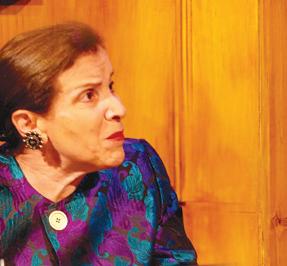
ON STAGE: Sisters in Law by Jonathan Shapiro. Various times through Dec. 11, Newman Center for the Performing Arts, 2344 East Iliff Ave., Denver. Tickets: $11–46, theatreor.com


1-3 p.m. Dec. 9, CU Art Museum, 1085 18th St., Boulder. Free Learn about historically underrepresented artists and create take-home collages at the CU Art Museum. Participants will enjoy food and drink while learning about artist Delita Martin as they work with their hands to ease a bit of tension during the overlap of holiday season and finals week.

Friday, Dec. 9
7:30 pm
United Church of Christ 1500 9th Avenue Longmont, CO 80501
Sunday, Dec. 11
4:00 pm
Saint Paul Lutheran Church 1600 Grant Street Denver, CO 80203
Thursday, Dec. 15
7:30 pm
Mountain View United Methodist Church 355 Ponca Place Boulder, CO 80303
Friday, Dec. 16 7:30 pm





First United Methodist Church 1421 Spruce Street Boulder, CO 80302
LIVESTREAM
DECEMBER 11
4:00 pm
From

Saint Paul Lutheran Church 1600 Grant Street Denver, CO 80203 arsnovasingers.org All Tickets $30
Dec. 9-10, Roosevelt Park, 700 Longs Peak Ave., Longmont. Free Take a winter walk around Roosevelt Park and enjoy the beautifully lit trees and decorations during this annual holiday tradition the whole family will remember.

All day Dec. 9-11, The Colorado Chautauqua, 900 Baseline Road, Boulder. Ticket prices vary.



Celebrate the holiday season at Chautauqua with a tree lighting ceremony, horsedrawn carriage ride, Santa’s Cottage, a historic cottage tour, a festival market and guided hikes. Pick up a WinterFest pass for $28 or buy tickets for specific activities. Some attractions, like the tree lighting, WinterFest Market and Art in the Park, are free.
■ A Celtic Winter 4-5:30 p.m. Saturday, Dec. 10, First United Methodist Church, 1421 Spruce St., Boulder. Tickets: $5-$50, boulderchorale.org


The Boulder Chorale is putting on a program of traditional Celtic music with this holiday ensemble. Adult and children’s choirs will sing several Celtic pieces, and perform their new traditional piece “Night of Silence.”
■
Various times, Dec. 9-11, Dairy Arts Center, 2590 Walnut St., Boulder. Tickets: $25-$33, thedairy.org

Frequent Flyers and Grande Orquesta Navarre are collaborating to bring a lighthearted evening of music and dance to the Dairy. The Flyers will perform on dance trapeze, lyra and aerial fabric while the four-piece Grande Orquesta Navarre accompanies with their cabaret-style music.



Various times and locations, Dec. 9-16. Tickets: $30, eventbrite.com
The Ars Nova Singers’ holiday program includes modern works by Gabriel Jackson, Laura Mvula, Bob Chilcott, Patrick Hawes and more. John Gunther, a jazz studies faculty as CU, will accompany several pieces on solo saxophone.


10 a.m.-7 p.m., Saturday, Dec. 10 and 10 a.m.-4 p.m. Sunday, Dec. 11, Nederland Community Center, 750 CO-72.
Attractions at the 2022 Holiday Mountain Market at the Nederland Community Center include fine food, wine and cocktails, along with vendors, music and a silent auction. Kids will even have the chance to meet Elsa Anna and Kristoff from Frozen.

ON THE BILL: Vocalist Thom Yorke and guitarist Johnny Greenwood of the iconic English avantrock band Radiohead bring their new project, The Smile, to the Mission Ballroom in Denver for a two-night stint, Dec. 10-11. The trio (featuring drummer Tom Skinner) performs in support of their latest, A Light for Attracting Attention, released this summer via XL Recordings. More details below.
★ FRIDAY, DEC. 9

Papadosio with Evanoff. 8 p.m. Boulder Theater, 2032 14th St. Tickets: $17-$25, z2ent.com
Mr. Carmack with BRUHAA, DON JAMAL, GOGIMAL. 9 p.m. Fox Theatre, 1135 13th St., Boulder. Tickets: $20-$25, z2ent.com
Toubab Krewe. 8 p.m. The Caribou Room, 55 Indian Peaks Drive, Nederland. Tickets: $15, thecaribouroom.com

Rabblefish. 7 p.m. Muse Performance Space, 200 E. South Boulder Road, Lafayette. Tickets: $20, museperformancespace.com

Chain Station. 8:30 p.m. Gold Hill Inn, 401 Main St., Boulder. Tickets: $15 cash cover charge

Koffin Kats. 9 p.m. Bluebird Theater, 3317 E. Colfax Ave., Denver. Tickets: $20, bluebirdtheater.net
★ SATURDAY, DEC. 10
Trace Bundy’s Acoustic Holiday Special with Yasmin Williams. 7:30 p.m. Boulder The-

ater, 2032 14th St. Tickets: $25-$35, z2ent.com
Covenhoven with Companion. 8 p.m. Fox Theatre, 1135 13th St., Boulder. Tickets: $15$17.50, z2ent.com
Sarah Banker. 7 p.m. Gold Hill Inn, 401 Main St., Boulder. Free

Buku // G-Rex. 9 p.m. Ogden Theatre, 935 E. Colfax Ave., Denver. Tickets: $19.95-$29, axs.com
Soen. 9 p.m. Bluebird Theater, 3317 E. Colfax Ave., Denver. Tickets: $25$30, bluebirdtheater.net


The Smile. 8 p.m. Mission Ballroom, 4242 Wynkoop St., Denver. Tickets: $75-$109.50, axs.com
★ SUNDAY, DEC. 11
Bant. 7 p.m. Muse Performance Space, 200 E. South Boulder Road, Lafayette. Tickets: $20, museperformancespace.com



Moors and McCumber. 7:30 p.m. Gold Hill Inn, 401 Main St., Boulder. Sold out.



The Smile. 8 p.m. Mission Ballroom, 4242 Wynkoop St., Denver. Tickets: $75-$110, axs.com
★

Another JOHNNYSWIM Christmas Tour. 8 p.m. Boulder Theater, 2032 14th St. Tickets: $35$37.50, z2ent.com
★ TUESDAY, DEC. 13
Dominic Fike: Out of Order Tour. 8 p.m. Ogden Theatre, 935 E. Colfax Ave., Denver. Tickets: $36.75, axs.com
★ WEDNESDAY, DEC. 14
Orebolo feat. Rick Mitaratonda, Peter Anspach, & Jeff Arevalo of Gooose. 7:30 p.m. Boulder Theater, 2032 14th St. Tickets: $35-$39.50, z2ent.com
Bartees Strange with Pom Pom Squad and They Hate Change. 8 p.m. Bluebird Theater, 3317 E. Colfax Ave., Denver. Tickets: $20, bluebirdtheater.net
★ THURSDAY, DEC. 15
Keller Williams with Dave Watts + Tye North. 8 p.m. The Caribou Room, 55 Indian Peaks Drive, Nederland. Tickets: $40, thecaribouroom.com
KXLLSWXTCH. 8 p.m. Bluebird Theater, 3317 E. Colfax Ave., Denver. Tickets: $20, bluebirdtheater.net

10 a.m., 11:30 a.m. and 1 p.m. Saturday, Dec. 10, Longmont Museum, 400 Quail Road. Tickets: $10, registration required

Cookies, hot chocolate and holiday cheer will be served with stories from Santa at the Longmont Museum. You’ll want to register early for this event — it sells out every year.
around these contradictions” between surf-rock and Christmas.






6-8 p.m., Thursday, Dec. 8, Canyon Gallery (Boulder Public Library - Main). Free



Get a peek into the massive collection of eccentric Boulder legend and former Boulder Public Library employee Joel Haertling, whose dedication to the potential treasures of local garage sales knows no bounds. To Have and to Hoard, running through Feb. 5 in the Canyon Gallery inside the library’s main branch, hosts an opening reception at the exhibition site — featuring a cross-section of objects collected by Haertling over the years, along with fascinating insight into his idiosyncratic acquisition and archival process.

5 in site



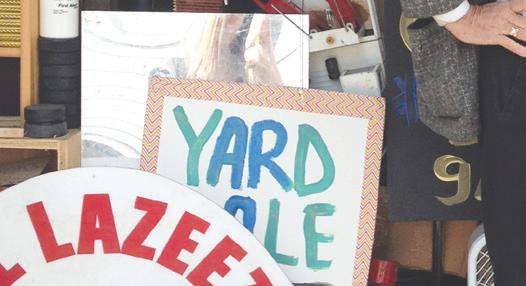
11 a.m.-3 p.m. Saturday, Dec. 10, Downtown Boulder
Celebrate the holidays on the Pearl Street Mall with holiday activities from free train rides to visits with Santa and crafts for all. Remember to play Find as many “Freezies” as you while you’re downtown in the area’s businesses. Once you find them, scan the QR code for a chance to win a $25 Downtown Boulder gift card.
exhibitors at the Boulder Y. Admission is free — ■



3-7 p.m. Sunday, Dec. 11, OBC’s Equality Center of the Rocky Mountains, 3340 Mitchell Lane, Boulder. Free
Out Boulder County is hosting a holiday meal for trans, non-binary and gender-expansive people at their annual Transgiving event. This substance- and alcohol-free celebration is for people over 18, but 16 and 17 year olds can attend with guardian permission.


■ Ryan Van Duzer: ‘The Long Way Home’
6 p.m. Tuesday, Dec. 13, Full Cycle Bikes & Colorado Multisport, 2355 30th St., Boulder






















































7:25-9:15 a.m. Saturday, Dec. 10, CU Boulder Campus
The “polar opposite” of the BOLDERBoulder, this 5K race will test your endurance and warmth. The top three men and women in each race win “Cold Medals.” Registration is closed, but you can still catch runners competing throughout the morning.



Local adventurer, filmmaker and YouTube personality Ryan Van Duzer heads to Full Cycle for the Boulder launch of his first book, The Long Way Home, about his bike adventure pedaling 4,000 miles from Honduras to Boulder after a two-year stint with the Peace Corps.

























The year is 1918, and Red troops are rounding up the White guards. War is on, and the insurgents are to be executed. But as the victors take their time playing by the rules of engagement, a fresh batch of White soldiers ride in and take the Red troops hostage. Their control doesn’t last long. Nothing does in The Red and the White Made in 1967, the feature by Hungarian filmmaker Miklós Jancsó is an absurdist take on warfare through the lens of the 1917 Soviet revolution. Borders are abstract; loyalties, too. A fistful of nationalities — Armenian, Cossack, Georgian, Hungarian and Russian — provide some grounding, but trying to keep track of who is who and which side is winning is the whole point.
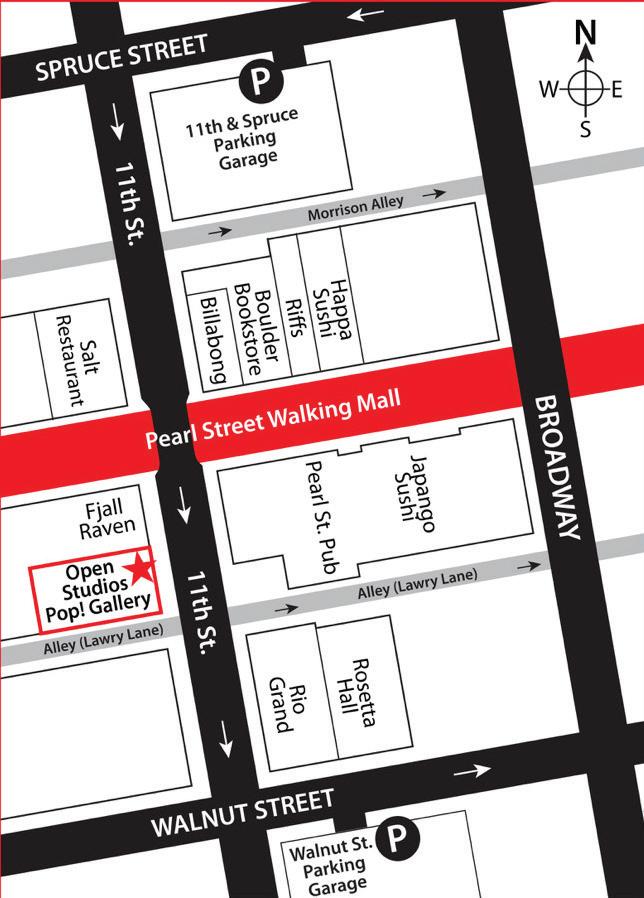

Cinematographer Tamás Somló films everything in long, bravura tracking shots with characters constantly told to come here, go there, run away, come back, stand up and sit down. Soldiers on foot stalk other soldiers. Riders on horses chase the soldiers. Biplanes overhead shoot at the riders and the running soldiers. It’s all chaos. And no matter which side has the upper hand, you can always see another battalion in the background coming for their turn at the top. You won’t have to squint hard to find parallels to present political situations. It would be hilarious if it weren’t so tragic.
The Soviets commissioned The Red and the White to celebrate the 50th anniversary of the October Revolution, but Jancsó’s film never screened in Russia. Watch it, and there’s little surprise as to why. The 1960s were a charged time politically and artistically, and filmmakers were pushing every boundary they found. New waves were crashing across Europe, and Jancsó was at the crest.






That’s what makes Kino Lorber’s newly released Miklós Jancsó Collection all the more exciting. Six feature films, all restored from the original camera negatives by the National Film Institute Hungary – Film Archive, alongside seven shorts and a bevy of commentaries provide, a master class in the increasingly overlooked cinema of Jancsó. It’s an outstanding set, perfect for the movie lover in your life.
Miklós Jancsó’s ‘The Red and the White’ tangles with the absurdity of war in the year’s best home video collection by Michael J. Caseyby Dan Savage

Dear Dan: I don’t know if you’re watching the second season of The White Lotus, but you’ll get this reference if you are: I’m a married straight woman who recently got herself a personal trainer. My husband cheated on me on and off for the first decade of our marriage. He agreed to see a marriage counselor with me, and he pretended that the cheating was tied to a deep-seated psychological issue. He may have believed that. Our counselor certainly believed it, and for a while I did too. But the cheating never stopped. It’s been a few years since I’ve had sex with him, but I don’t want to leave him because we have kids, and our relationship is actually pretty loving and low conflict now that we’re not fighting about cheating. (It also helps that I don’t have to worry about getting gonorrhea from him ever again.)
The kids need me less these days, so I got a personal trainer about a year ago. I don’t feel guilty or bad about it. But I somehow feel both guilty and bad for not feeling guilty or bad. What is that about?
—Abundant Personal Training




Dear APT: First and most importantly, APT, of course I’m watching the second season of The White Lotus. Mike White is a genius, I can’t wait for the finale, but I never want it to end. (Here’s hoping Cameron and Ethan at least make out before one or both or neither of them dies.) Moving on…
You shouldn’t feel bad about seeking sex elsewhere — excuse me, for seeking personal training elsewhere — but you already know that. And if you’re feeling bad about not feeling bad… well, that’s most likely because sessions with your personal trainer aren’t just about personal training. They’re about that, of course, but they’re also about your marriage. Your marriage isn’t what you expected it would be, APT, and now you aren’t someone you expected to be — you know, the kind of woman who has a personal trainer. So, I don’t think you’re feeling guilty and bad for not feeling guilty or bad. I think you’re feeling grief (for what your marriage was supposed to be) and relief (at making peace with your marriage as it is) Enjoy those sessions, APT, you’ve earned them.



Dear Dan: I’ve just started wearing a metal cock cage and want to wear it for longer and longer periods of time. How do men in chastity devices get through airports? Do they think about security?
—Can’t Ask Google Everything

Dear CAGE: “No man who wears a chastity device doesn’t think about security lines at airports,” said SeattleLocked, a man who wears a chastity device. “And us guys in chastity pretty much fall into two camps. There are those who do not wish to pull others into their kink, and there are those who do not give a fuck.”
SeattleLocked, who currently falls into the “do not pull others in” camp, has been into chastity devices and orgasm denial for as long as his dick has been getting hard, but he’s gone through airport security locked and unlocked.
“If you don’t want to pull other guys into your kink, you organize removal before and re-installation after security,” said SeattleLocked. “If you don’t give a fuck, you happily submit to be strip-searched in that weird little booth while smirking at the TSA dudes.”
Basically, CAGE, a locked guy is given the key to his chastity device before he goes through security, slips into a bathroom to remove the device, slips it into the bag he’s taking through security, and then immediately heads to a bathroom after security to lock himself back up — ideally under the close supervision of his keyholder, to make sure he isn’t tempted rub one out prior to boarding. Now, there’s a good chance a bag containing a male chastity device will wind up being searched after it’s x-rayed, of course, but by this point in time — more than 20 years after the creation of the Transportation Safety Administration — every TSA agent has seen a male chastity device (in a bag, on a dick), heard about them, or worn one.
“Modern technology also offers personalized high-tech polycarbonate options, as an alternative to steel or titanium chastity devices,” said SeattleLocked, “and those cages make sailing through security a breeze—if you’re TSA-Pre.”

People who have completed the TSA-Precheck process pass through simple metal detectors, and a plastic or polycarbonate chastity device won’t set off a metal detector. People who haven’t completed the TSA-Precheck process have to step inside those “full-body scanners,” which are designed to detect any object, metal or otherwise, hidden under a person’s clothing… by creating a digital image of a person’s body sans clothing. So, it’s not just locked guys in the don’t-give-a-fuck camp who get strip-searched at the airport.
Questions to mailbox@savage.love Podcasts, columns and more: Savage.Love














The most popular New Year’s resolutions each year, according to polls, relate to diet, exercise and weight loss. It makes sense that folks would resolve to turn around the ship after finding themselves out the back end of holiday season. Alas, by the time New Year’s Day rolls around, the damage has already been done. Losing weight is a lot harder than avoiding it in the first place. That is why now, rather than January, is the time to craft a plan that will help you navigate the treacherous temptations of the holiday food table. Here are some thoughts on the subject, followed by a recipe for massaged kale salad that is guaranteed to leave your belly happy and full of fiber.
1. Treat your stomach space like the most valuable real estate, like Victorians treated virginity. Don’t just give it away to the first hors d’oeuvres tray that floats by. It’s easy to surrender to filling your belly with whatever is within arm’s reach. Just don’t. If there is nothing good to eat then don’t eat. Take a breather. Something more worthy of your belly will be around soon enough.
2. The day after a feast, wait until lunchtime to eat breakfast. Some people worry that skipping breakfast leads to more eating later in the day to compensate, which can supposedly cause weight gain. But the most recent evidence (not to mention the anecdotal experiences of vocal breakfast-skippers) suggests that response is rare. In any case, during the holidays you already know you are going to eat more later in the day, so skipping breakfast to compensate for the gluttony to come makes sense. And after a night of feasting you might just sleep in until lunchtime anyway.
3. Up the activity. I don’t mean to imply that you can exercise away the excess, because unless you’re an endurance athlete, your workouts probably won’t compensate for the level of gluttony typical of the holidays. But exercise is always good for you, and will help you build some discipline that you can put to work at the holiday trough. And if you’re skipping breakfast, you do have that time slot available….
4. Pre-party with green plant fiber. If you show up with a belly that has something in it, you won’t be that guy crowding the food table before it’s time to eat. Arriving at a lavish buffet with fiber in your belly has other benefits, too. Greens are generally a good digestive aid that will help move along all the custard puffs, pumpkin pies and cookies that might tempt you. Here are three kale-focused recipes to enjoy this holiday season. If you’re headed to a party, start the evening with a bowl or two of this massaged kale salad. And maybe bring some to the potluck if you think the other guests might want some tasty fiber in their lives.

In this recipe, you use your hands to knead the kale with salt and lemon or lime juice. This action breaks the cell walls, leaving the kale soft, pliable and easier to eat. My kale of choice is the long and narrow-leafed Lacinato kale, which also goes by the names Dino kale, black kale, and Tuscan kale. Curly green kale is a good second choice.





The action of physically squeezing the leaves in salt and lemon juice softens them, almost like a light saute would, and makes them a joy to eat. Just remember that like many salads, this one isn’t low on calories. But at least the calories come from fat, which, like fiber, sates the belly and takes the edge off of hunger. That is why calories from salad are better for you than eggnog calories.
6 cups kale, center ribs removed, chopped crosswise to about 4 tablespoons lime or lemon juice
1/2 inch slices
1 teaspoon salt
1 clove garlic, pressed (garlic lovers can multiply as necessary)
1/2 cup olive oil
1 tablespoon dijon mustard







1/4 cup grated Parmesan or crumbled feta Place the kale, lime and salt in a large mixing bowl. Squeeze handfuls of kale as hard as you can, over and over, for about a minute. Add the rest of the ingredients, toss together and serve.

Chunks of potatoes plastered and speckled with kale, full of that unmistakable potato salad-y flavor of summer. Here at the beginning of winter, you can serve it warm as a comforting bowlful. After a day in the fridge, meanwhile, it will improve. I like to fry the leftovers in the greasy presence of chopped bacon.
4 cups diced red potatoes, peeled or not
4-ish cups of kale (or other fibrous greens), stripped from the center vein and chopped. Optional: chop up the ribs, which are tougher, to cook with the potatoes. If using frozen kale, it should be thawed.
2 cups stock or water
1/2 cup olive oil (or more, to taste)
1/4 cup white vinegar
1/2 tablespoon mustard powder



1 teaspoon dried thyme
1/2 teaspoon celery seed
1 teaspoon ground or dried rosemary
1/4 teaspoon black pepper
2 garlic cloves, and more to taste, minced or grated
1/2 cup minced onion
1/2 cup minced celery
1 cup finely diced cheddar cheese
Salt, to taste
Optional: red pepper flakes
Boil potatoes in stock or water with 3 tablespoons of olive oil. About 10 minutes in, add any chopped kale rib.
While the potatoes are cooking, make the dressing. Combine remaining oil, vinegar, mustard powder, herbs and garlic. If using whole dried herbs, powder them between your fingers as you add them. Shake vigorously in a closed jar or otherwise stir very well.
When the potatoes are nearly tender, add the kale and stir it in with a scooping motion so as not to crush the potatoes. When the liquid is gone, turn off the heat.
If serving warm, finish the recipe immediately. If serving cold, let the potatoes and kale cool first.
To finish, add the onion, celery, cheddar, pepper flakes if using and dressing, and toss the salad. Add more salt and/or oil to taste. If serving cool, it’s best to make kale potato salad a day ahead. Just make sure to make extra, or there won’t be enough.

A mellow bowl of kale and potato soup that will leave you feeling nourished and satisfied.

Serves six 4 large potatoes, peeled and diced 1 large onion, minced 1/2 cup olive oil

Whole bell pepper 2 bay leaves Zest of a lemon 2 cubes or equivalent veggie bouillon 1 bunch kale

1/2 pound linguica (or chorizo)
Boil the potatoes for a half hour in a gallon of water. Then allow to cool. In a soup pot, meanwhile, saute the onions in the oil on medium heat. Add the whole bell pepper to the pan.
When the potatoes are cool enough to work with, mash in the water until almost smooth.
When the onions are translucent – about 15 minutes — add the potato water to the soup pot. Add the bay leaves and veggie bouillon. Simmer for 30 minutes.
Slice the linguica into half-inch rounds. Brown them on the grill or pan. Add the linguica rounds to the soup pot along with the zest. Simmer for 15 minutes. Remove the ribs from the kale and mince the leaves crosswise. Add the kale to the pot. Cook another five minutes. Season with salt, and serve.





























Erin Johnson was enrolled in the University of Colorado Skaggs School of Pharmacy and Pharmaceutical Sciences when she took her first cannabis class. As a student of pharmaceuticals, she says she naturally found the subject fascinating — especially since her father had been growing cannabis since the early days of medical legalization in Colorado.
“My dad is a farmer and he grew cannabis as a caregiver,” Johnson says. “His friend’s wife had breast cancer, so he was growing it [for her].”
Learning about the medical and chemical properties of cannabis in an academic setting excited Johnson. So much so that after graduating from the CU School of Pharmacy, she went on to complete CU’s new graduate certificate in cannabis science and medicine.
Now she’s making a cannabis salve for her small Colorado mountain community. She calls it Butter Flower Balm, and it’s a product of both her passion for natural medicines and of her CU cannabis education.

Johnson isn’t the only student from CU School of Pharmacy who’s pursued an interest in cannabis through the school’s new certificate program. According to David Kroll, a professor with the Skaggs School of Pharmacy, they’ve got a mix of health professionals, students of science and people already in the cannabis industry enrolling in the new program.
It’s becoming more robust every semester, Kroll says. There’s a genuine interest in this plant, its medicinal properties, and the industry growing around it. And until recently, there wasn’t an academically accredited way to learn about it. A survey of health professionals by the Mayo Clinic found only half said they were prepared to answer patient questions about medical cannabis, and
three-quarters wanted to learn more.
Realizing that, in the spring of 2020, CU started offering the Cannabis Science and Medicine Program as an eight-week continuing education (CE) certificate.
“We’ve always felt that we have a responsibility to patients and to practitioners to give evidence-based information about plant medicines,” Kroll says.

The response was so positive, the school decided to take it a step further. In June of 2020, CU announced it was going to offer graduate-level cannabis education, becoming the first school in the state to do so.
One student is doing their capstone with the Colorado Department of Public Health and Environment, compiling published drug interactions of THC and CBD with the top 200 prescribed drugs in the United States. Another is looking at the concentrations of specific terpenes in the same strains from different dispensaries, to see their chemical similarities. A third student is writing a series of science articles for Cannabis Wire about cannabis issues in New York City.
The certificate program requires nine-credit hours to complete, with an optional two-credit lab course. It costs $773 per credit (about $7,000 for the nine credits), and all of them can be applied toward a 30-credit hour master of science in pharmaceutical sciences degree with an emphasis on cannabis science and medicine.
The program also offers a full 30-credit hour master’s degree in cannabis science and medicine, with both a thesis track and a non-thesis track.

But the best part, Kroll says, is that all of this is offered virtually.
“Our whole thing has been flexibility for the student,” he says.
For the coursework, CU tapped its own faculty as well as utilizing experts from outside academia. They bring in clinical practice experts, clinical researchers, medicinal plant chemists and pharmacologists, and legal and regulatory leaders in the cannabis industry to lead case-based discussions.
“We want to give students the tools that even if they can’t get a job in the cannabis industry, they can still get jobs in the dietary supplement, herbal medicine industry, anywhere,” Kroll says.
The program offers a basic cannabis pharmacology class, a cannabis therapeutics class, a cannabis neurology class, a class about the legal and regulatory issues surrounding cannabis, and Kroll’s cannabis writing class, among others. Then students wrap the certificate program with a capstone project.
Which is attracting students far and wide. They might be pharmacists, nurses, physicians and other healthcare professionals who want to answer patient questions about cannabis. They might be people already in the cannabis industry, who want to learn more about the plant they’re working with. Or, they might be pharmacists like Johnson, who want to make cannabis products that will help the people around them.



Johnson’s Butter Flower Balm is a budding business, and a direct result of seeds planted during the CU cannabis and science certification program. She makes the salve with almond seed oil, coconut oil, jojoba oil and extract from cannabis plants she grows herself, outdoors, without any pesticides or chemical supplements.
Johnson says she’s not trying to get rich off of Butter Flower Balm — but as long as it’s helping people, she’s going to continue making it.
“I have enough people in my life that love [the salve], even if I don’t make any money on it and I can just help people... I’ll continue to make it until the end of time because I love it,” she says. “It’s a total labor of love.”
Program is cultivating passion and interest in pharmacy students











